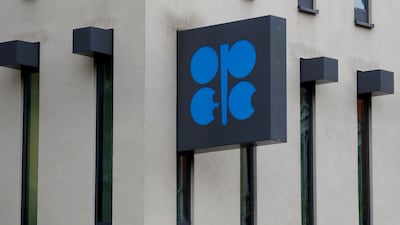Opec+, the group of oil-exporting countries behind recent historic production cuts, will bring 400,000 barrels per day back to the markets in August and will revise baselines used to calculate quotas from May 2022, following requests by countries including the UAE.
Under the latest agreement, the UAE's new production baseline will increase to 3.5 million barrels per day, from 3.168 million bpd previously. Other producers including Iraq, Kuwait, Saudi Arabia, and Russia will also see their baselines rise.
The UAE "is committed to this group and will always work within this group to do our best to achieve the market balance and help everyone", Minister of Energy and Infrastructure, Suhail Al Mazrouei, said at a ministerial meeting held online on Sunday. "The UAE will remain a committed member in the Opec alliance."
Opec+, which is headed by Saudi Arabia and Russia, extended its agreement until the end of December 2022. The group reached a consensus over the phasing out of 5.8 million bpd of withheld supply following weeks of deadlock and will review the pact at the end of the year.
"We're dealing with uncertainty. And if you are dealing with uncertainty, the first thing you need to do is to acquiesce to the concept that you cannot predict uncertainty," Prince Abdulaziz bin Salman, Saudi Arabia's energy minister told reporters after the meeting.
"So yes, we will keep the 400,000 bpd on a monthly basis. We will review in December. We kept our window open for review. If things go as well hopefully by September 2022, we will return to the market the 5.8 million bpd but the spirit that you see today will enable us to even go beyond 2022," he said.
The UAE and Saudi Arabia "will always work together as two countries and also with all of the countries in the group", Mr Al Mazrouei said.
The Emirates, which is Opec's third-largest producer, is investing heavily in raising its production capacity to 5 million bpd by 2030 and had earlier called on fellow producers to use a more current baseline to allocate its quota.

The UAE had argued earlier that the previous baseline was not reflective of changes in its capacity to produce oil.
Under the old baseline, the discrepancy between the UAE's current production capacity and that of October 2018 was nearly 18 per cent – the highest proportion among producers within the bloc.
Oil prices ended last week down nearly 4 per cent in one of the steepest weekly declines since March.
Following the Opec+ decision to boost supply, Brent, the international benchmark, is still headed towards $80 per barrel as demand is set to outpace supply, said Giovanni Staunovo, commodity analyst at Swiss bank UBS.
"With some further production increases over the coming months from Opec+, we also see the market becoming less tight as we move towards the end of the year and so expect a modest price setback towards $75 per barrel," he added.
Opec+ still "want to keep their hands on the steering wheel" with the group's monthly meetings so as to remain flexible and adjust amid unforeseen events, said Mr Staunovo.
The group's latest show of consensus will provide a signal to non-Opec players regarding future investment plans and keep oil prices in backwardation [a trend where future prices are lower than they are currently], he added.
Opec+ will host its next ministerial meeting on September 1.


